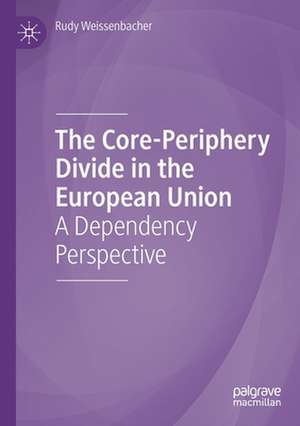The Core-Periphery Divide in the European Union: A Dependency Perspective
Autor Rudy Weissenbacheren Limba Engleză Paperback – 26 aug 2021
This book revisits the forgotten history of the 'European Dependency School' in the 1970s and 1980s, explores core-periphery relations in the European integration process and the crises of the contemporary European Union from a dependency perspective, and draws lessons for alternative development paths.
Was disintegration of the European Union foretold? With the benefit of hindsight, the critical analysis of the European integration process by researchers from the 'European Dependency School' is most timely. The current framework of the European Union seems to be haunted by issues that had been very familiar to the researchers of the 'European Dependency School', such as a lack of a common and balanced industrial policy. How do the situations compare? What lessons can be learnt for alternative development policies in contemporary Europe?
Weissenbacher tackles these issues, which are of relevanceto all interested in political economy, political science, development studies and regional development.
Weissenbacher tackles these issues, which are of relevanceto all interested in political economy, political science, development studies and regional development.
| Toate formatele și edițiile | Preț | Express |
|---|---|---|
| Paperback (1) | 700.42 lei 6-8 săpt. | |
| Springer International Publishing – 26 aug 2021 | 700.42 lei 6-8 săpt. | |
| Hardback (1) | 704.17 lei 6-8 săpt. | |
| Springer International Publishing – 30 ian 2020 | 704.17 lei 6-8 săpt. |
Preț: 700.42 lei
Preț vechi: 824.03 lei
-15% Nou
Puncte Express: 1051
Preț estimativ în valută:
134.03€ • 140.22$ • 111.34£
134.03€ • 140.22$ • 111.34£
Carte tipărită la comandă
Livrare economică 02-16 aprilie
Preluare comenzi: 021 569.72.76
Specificații
ISBN-13: 9783030282134
ISBN-10: 3030282139
Pagini: 369
Ilustrații: XXIII, 369 p. 30 illus., 23 illus. in color.
Dimensiuni: 148 x 210 mm
Greutate: 0.52 kg
Ediția:1st ed. 2019
Editura: Springer International Publishing
Colecția Palgrave Macmillan
Locul publicării:Cham, Switzerland
ISBN-10: 3030282139
Pagini: 369
Ilustrații: XXIII, 369 p. 30 illus., 23 illus. in color.
Dimensiuni: 148 x 210 mm
Greutate: 0.52 kg
Ediția:1st ed. 2019
Editura: Springer International Publishing
Colecția Palgrave Macmillan
Locul publicării:Cham, Switzerland
Cuprins
Chapter 1. Introduction.- Chapter 2. Studying Dependencies: A Conceptual Framework from the Periphery.- Chapter 3. Development Studies and the Dependency Approach in European Research Networks of the 1970s and 1980s.- Chapter 4. Old Paradigms and New Crises.- Chapter 5. Core and Periphery from Cold War to Monetary Integration.- Chapter 6. Alternative Strategies in the ‘European Dependency School’.- Chapter 7. Paradigm Lost? ‘Endogenous Development’ Replaces ‘Selective Self-Reliance’.- Chapter 8. Persistent Core-Periphery Divide in the EU.- Chapter 9. Capitalism and Beyond?
Notă biografică
Rudy Weissenbacher is a researcher at the Institute for International Economics and Development, Vienna University of Economics and Business (WU Vienna), Austria.
Textul de pe ultima copertă
This book revisits the forgotten history of the 'European Dependency School' in the 1970s and 1980s, explores core-periphery relations in the European integration process and the crises of contemporary European Union from a dependency perspective, and draws lessons for alternative development paths.
Was disintegration of the European Union foretold? With the benefit of hindsight, the critical analysis of the European integration process by researchers from the 'European Dependency School' is most timely. The current framework of the European Union seems to be haunted by issues that had been very familiar to the researchers of the 'European Dependency School', such as a lack of a common and balanced industrial policy. How do the situations compare? What lessons can be learnt for alternative development policies in contemporary Europe?
Weissenbacher tackles these issues, which are of relevance to all interested in political economy, political science, development studies and regional development.
Was disintegration of the European Union foretold? With the benefit of hindsight, the critical analysis of the European integration process by researchers from the 'European Dependency School' is most timely. The current framework of the European Union seems to be haunted by issues that had been very familiar to the researchers of the 'European Dependency School', such as a lack of a common and balanced industrial policy. How do the situations compare? What lessons can be learnt for alternative development policies in contemporary Europe?
Weissenbacher tackles these issues, which are of relevance to all interested in political economy, political science, development studies and regional development.
Rudy Weissenbacher is a researcher at the Institute for International Economics and Development, Vienna University of Economics and Business (WU Vienna), Austria.
Caracteristici
Revisits a forgotten alternative school from the 1980s Proposes lessons for contemporary Europe from Eurpean Dependency School of thought Proposes a conceptual framework of the European Periphery
